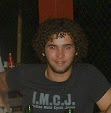Keeping the fictional bouncing, I would like to suggest an HBO TV series created by Damon Lindelof and Tom Perrotta, The Leftovers. If Lindelof ring the bell is probably because you already watched Lost (a show of which Damon Lindelof is also a creator). In such a case, I would either strongly suggest you to watch The Leftovers as well, or advice you keep a safe distance from it, one or the other depending on your reaction to the last episode of Lost. The Leftovers is somehow in line with Lost (and perhaps also with Battlestar Galactica) in the sense that there is more to it than arriving at "the end", where everything might be expected to be explained and clear. The premise, developed in the novel by Perrotta that inspired the show, is the following: an extraordinary event removed 2% of the global population from the face of the Earth instantly. Of course, anyone can see that such a small number cannot affect drastically the functioning of our civilization. What it is less banal is the deep influence it starts to have at the family level and the sociological changes that it triggers. As you can tell from the name, The Leftovers is not about those who departed, instead, it focuses on those who remained. While watching, you will behold the silent pain of people who saw relatives disappearing out thin air, people whose lives were distorted as a result of tuning their moral/religious standpoints because of the Departure event, and the constant struggling of those that are simply trying to make a sense out of it, and overcome it. The Leftover is dark and challenging, but it is also well scripted and well acted. Furthermore, there is a great selection of characters and plots that will keep you on the edge of your seat.
Enjoy the making-of!

Comments
Post a Comment